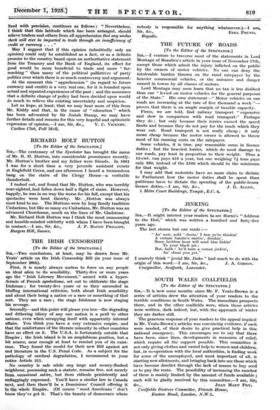THE FUTURE OF ROADS
[To the Editor of the SPECTATOR.] , Sra,—I venture to traverse most of the statements in Lord Montagu of Beaulieu's article in your issue of November 17th, except those which admit the injury inflicted on the public by the owners of motor vehicles. No one can deny the, intolerable burden thrown on the rural ratepayer by the heavier commercial vehicles, or the nuisance and danger caused in towns by all classes of motors.
Lord Montagu may soon learn that no tax is less disliked than one " levied on motor vehicles for the general purposes of the State." His own statement—" Motor vehicles on our roads are increasing at the rate of five thousand a week "- proves that there is an ample margin of taxable capacity.
Firms, we are told, find railway transport " expensive and slow in comparison with road transport." Perhaps they dO ; but only because their lorries exceed the speed limits and because they do not pay for the roads which they wear out. Road transport is not really cheap ; it only seems cheap because the motor owner is allowed to throw, most of his running costs on the ratepayer. .
Some vehicles, it is true, pay reasonable sums in licence duties ; but the heaviest lorries, which do most damage to our roads, pay least in proportion to their weight. Thus a 15-cwt. van pays £16 a year, but one weighing 71 tons pays only £60, instead of the £160 which should be the minimum for that weight.
I may add that motorists have no more claim to dictate to Parliament how the motor duties shall be spent than publicans have to dictate the spending of the public-house
licence duties.—I am, Sir, &c., J. E. ALLEN. 1 Mitre Court Buildings, Temple, E.G. 4.








































 Previous page
Previous page